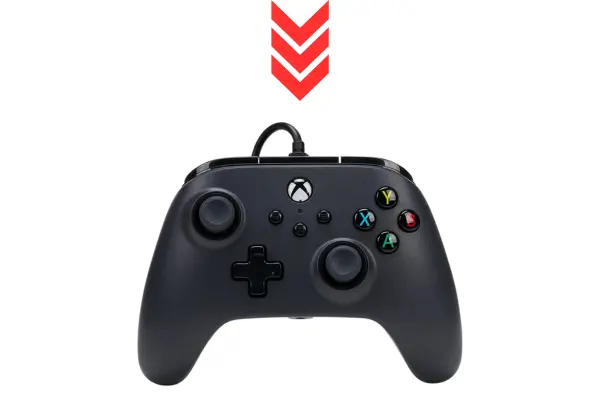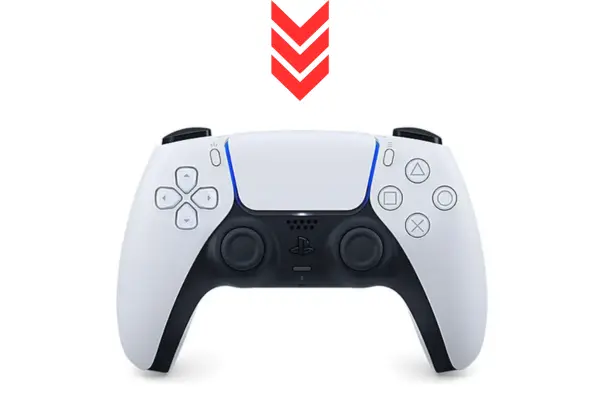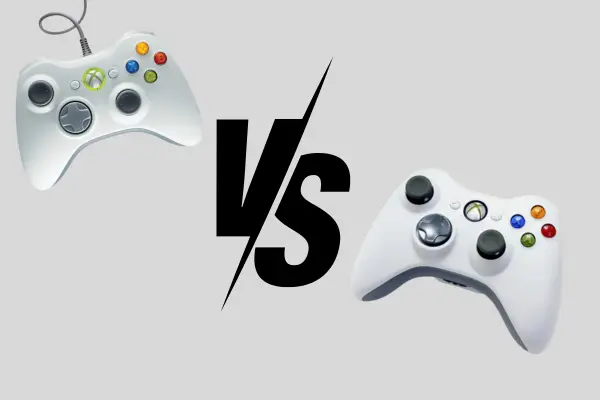The debate between wired vs wireless controllers is as old as modern gaming itself. Gamers and tech enthusiasts often find themselves in heated discussions about which type of controller offers the best performance, particularly when it comes to input latency.
Input latency, or the delay between pressing a button and seeing the corresponding action on screen, can significantly affect the gaming experience, especially in fast-paced or competitive games.
This article aims to provide a thorough comparison of wired vs wireless controllers. We will jump into the specifics of input latency, explore the advantages and disadvantages of each type, and share insights from a detailed experiment conducted to measure the performance of both wired and wireless controllers on the Xbox Series S.
By the end of this article, you will have a clearer understanding of which controller might be better suited for your gaming needs.
📌What is Input Latency?
Input latency is the time it takes for an input (like pressing a button on a controller) to be processed by a gaming console and result in an action on the screen.
This delay is measured in milliseconds and can be critical in gaming, where split-second decisions often make the difference between victory and defeat.
📌How Input Latency Affects Gaming Performance?
Input latency directly impacts gaming performance. In genres like first-person shooters (FPS), fighting games, and racing games, low latency is crucial. Here are some examples of how input latency can affect gameplay:
✔FPS Games
Quick reflexes are essential. High latency can mean the difference between hitting an opponent or missing, leading to frustrating deaths.
✔Fighting Games
Combos and precise timing are key. Latency can disrupt the flow of attacks and defenses, putting players at a disadvantage.
✔Racing Games
Fast reactions to turns and obstacles are necessary. Delay in inputs can cause crashes or missed opportunities for overtaking.
📌Wired Controllers

➡️Advantages of Wired Controllers
Wired controllers have long been the standard in gaming, known for their reliable performance and lower input latency. Here are some of the primary advantages:
✔Lower Input Latency
Wired controllers typically have less input latency because the signal travels directly through the cable to the console. This direct connection reduces the chances of delay caused by interference or signal loss.
✔Consistent Power Supply
Wired controllers do not rely on batteries, ensuring consistent performance without the risk of sudden disconnections or power drops during critical gaming moments.
✔Cost-Effectiveness
Generally, wired controllers are cheaper than their wireless counterparts. They do not require batteries or charging kits, which can save money in the long run.
| Advantage | Description |
|---|---|
| Lower Input Latency | Direct signal transmission reduces delay. |
| Consistent Power Supply | No need for batteries or recharging. |
| Cost-Effectiveness | Typically cheaper with no additional costs for batteries. |
Technical Explanation: Why Wired Controllers Have Lower Latency
The low latency of wired controllers can be attributed to the direct electrical connection between the controller and the console.
This connection allows for the rapid transmission of electrical signals without the need for conversion to radio waves, which can introduce slight delays.
Additionally, wired connections are less susceptible to interference from other wireless devices, ensuring a more stable and consistent signal.
➡️Disadvantages of Wired Controllers
While wired controllers have their benefits, they are not without drawbacks. Some of the disadvantages include:
✔Limited Mobility
The length of the cable restricts movement, which can be a significant drawback for gamers who prefer to sit far from their gaming setup or who move around while playing.
✔Potential for Cable Damage and Tangling
Over time, cables can become damaged, tangled, or frayed. This can lead to connectivity issues or the need for replacement cables.
✔Inconvenience in Setup and Storage
Wired controllers can add to the clutter around a gaming station, making setup and storage less convenient.
| Disadvantage | Description |
|---|---|
| Limited Mobility | Cable length restricts movement. |
| Potential Cable Damage | Cables can become damaged or tangled over time. |
| Inconvenience | Additional clutter and setup inconvenience. |
📌Wireless Controllers

➡️Advantages of Wireless Controllers
Wireless controllers offer a different set of benefits that cater to the needs of many gamers. Here are some of the primary advantages:
✔Increased Mobility and Convenience
Wireless controllers allow gamers to sit anywhere in the room without being tethered to the console. This flexibility enhances comfort and convenience, particularly in living room setups.
✔Less Clutter
Without cables, wireless controllers contribute to a cleaner and more organized gaming area. This can be particularly beneficial in setups with multiple gaming systems or devices.
✔Ease of Use
Modern wireless controllers are designed to be user-friendly, often featuring easy pairing processes and stable connections. The absence of cables also reduces the risk of tripping hazards.
| Advantage | Description |
|---|---|
| Increased Mobility | Freedom to move without being tethered to the console. |
| Less Clutter | No cables contribute to a cleaner gaming area. |
| Ease of Use | Simple pairing processes and reduced risk of tripping hazards. |
Technical Explanation: How Wireless Controllers Work
Wireless controllers communicate with gaming consoles using radio frequency (RF) signals, typically Bluetooth or proprietary RF protocols. These signals are sent through the air, allowing for communication without the need for physical connections. Advances in wireless technology have significantly reduced the latency and improved the reliability of these connections.
➡️Disadvantages of Wireless Controllers
Despite their advantages, wireless controllers come with their own set of drawbacks:
✔Potential for Higher Latency
Historically, wireless controllers have been associated with higher input latency compared to wired controllers. While modern advancements have mitigated this issue, it can still be a concern for competitive gamers.
✔Battery Life and Maintenance
Wireless controllers require batteries or regular recharging. This adds an additional layer of maintenance and can be inconvenient if the controller runs out of power during a gaming session.
✔Interference and Connectivity Issues
Wireless signals can be prone to interference from other electronic devices, potentially causing connectivity issues or increased latency.
| Disadvantage | Description |
|---|---|
| Potential for Higher Latency | Wireless signals may introduce slight delays. |
| Battery Life Maintenance | Requires batteries or regular recharging. |
| Interference Issues | Prone to signal interference from other devices. |
📌Conducting the Experiment: Wired vs Wireless on Xbox Series S
To provide empirical data on the input latency of wired and wireless controllers, we conducted a detailed experiment using an Xbox Series S. Here’s how the experiment was set up and the results we obtained.
✔Both wired and wireless Xbox Series S controllers were tested.

✔The experiment involved pressing a button on the controller and recording the response time on the TV.
✔The footage was then analyzed to count the number of frames between the button press and the on-screen action.
The results were surprising and somewhat counterintuitive to the common belief that wired controllers always outperform wireless ones.
| Controller Type | Latency (Frames) |
|---|---|
| Wireless | 3, 2, 3 |
| Wired | 5, 4, 4 |
The results showed that the wireless controller had an average latency of approximately 3 frames, while the wired controller averaged about 4.33 frames. This was surprising because it contradicted the common assumption that wired controllers always have lower latency.
The experiment suggests that for the Xbox Series S, wireless controllers can offer comparable, if not better, performance in terms of input latency. This might be due to the console’s optimization for wireless controllers, leveraging advanced RF technology to minimize latency.
📌Which Controller Should You Choose?
The choice between wired and wireless controllers ultimately depends on your specific gaming needs and preferences. Here are some considerations to help you decide:
✔Competitive Gaming
If you are involved in competitive gaming and need the absolute lowest latency, a wired controller might be preferable. However, as our experiment showed, modern wireless controllers can be just as effective, especially on optimized systems like the Xbox Series S.
✔Casual Gaming and Comfort
For casual gaming, where convenience and comfort are prioritized, wireless controllers offer greater mobility and less clutter, making them an excellent choice.
✔Practical Considerations
Consider your gaming setup and how you use your space. If you frequently move around or play from different seating positions, wireless controllers provide the flexibility you need.
| Controller Type | Pros | Cons |
|---|---|---|
| Wired | Lower latency (traditionally), consistent power supply, cost-effective | Limited mobility, potential for cable damage, less convenient setup |
| Wireless | Increased mobility, less clutter, ease of use | Potential for higher latency, battery maintenance, prone to interference |
Conclusion: Wired vs Wireless Controller
The debate between wired and wireless controllers is complex and nuanced. While wired controllers have traditionally been favored for their lower latency, modern wireless controllers have closed the gap significantly. As our experiment with the Xbox Series S demonstrated, wireless controllers can offer competitive performance, making them a viable option for both casual and competitive gamers.
Ultimately, the best choice depends on your gaming style, setup, and personal preferences. By understanding the advantages and disadvantages of each type of controller, you can make an informed decision that enhances your gaming experience.
For more insights and updates on gaming technology, stay tuned to our blog. Happy gaming!

